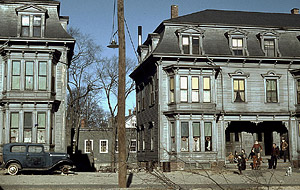Glenn Reynolds quotes Roger Simon who notes that �People like Reid, Hastert, Pelosi are complete mediocrities� and that �something is fundamentally wrong� that such people are in the upper reaches of government. Reynolds concludes that �Politics is not attracting our best people.�
This has been an accurate complaint since immediately after the Founding generation. But, still, the whole thing worked anyway, and always has.
Lord Bryce, in his classic American Commonwealth (1888), had a famous chapter entitled Why the Best Men do not Go into Politics. Some of the details of his analysis are outdated, but the general reasoning is still sound. I cannot do justice to it, so go read it, but a very rough sketch goes as follows. The fact is that being in Congress is not a very good career. It was not then and it is not now. It is precarious, and Americans are rarely so wealthy that they can withstand having their career obliterated without suffering a great personal loss. Service in Congress removes the member from his own district where his future business contacts would have to be. It incapacitates the member for other work during and after his term of service. And there is the mundane and dreary nature of the day-to-day work of congresssmen. There is little opportunity for politicians to engage in very exciting activity, thankfully, very often, which would call for heroic or even truly creative effort. What we would call opportunity costs � the far superior chances for great material success, at lower risk, in the private economy lead to the same outcome in 2006 as they did in 1888.
Bryce expressly rules out any idea that the tough treatment politicians get is any reason why American politicians are so noticeably bad:
It may however be alleged that I have omitted one significant ground for the distaste of �the best people� for public life, viz., the bad company they would have to keep, the general vulgarity of tone in politics, the exposure to invective or ribaldry by hostile speakers and a reckless press.
I omit this ground because it seems insignificant. In every country a politician has to associate with men whom he despises and distrusts, and those whom he most despises and distrusts are sometimes those whose so-called social rank is highest�the sons or nephews of great nobles. In every country he is exposed to misrepresentation and abuse, and the most galling misrepresentations are not the coarse and incredible ones, but those which have a semblance of probability, which delicately discolour his motives and ingeniously pervert his words. A statesman must soon learn, even in decorous England or punctilious France or polished Italy, to disregard all this, and rely upon his conscience for his peace of mind, and upon his conduct for the respect of his countrymen. If he can do so in England or France or Italy, he may do so in America also.
It has always been an ugly game, in a country where the other games are more appealing, and the people who go into it are rarely going to be our �best� people by any reasonable criterion.
I strongly advise you to read the whole Bryce chapter. It is not long.
Having mediocre politicians is a consequence of our having a superb private economy. We are, actually, fortunate that we have some relatively competent and public-spirited people in public life at all.
This is not a problem with a solution, but a permanent, structural condition.
Nor is it one that needs to concern us much.
We do not rely for the success of our public institutions that they be staffed by geniuses or the shining lights of the age. To the contrary, as Walter Bagehot noted, we rely on our legislatures to act in the aggregate, to be wiser and abler collectively, or at least able to discern and respond to the public mood and public interest, than the mere sum of its parts, to capture the “wisdom of crowds”. The process seems to work. Despite all its defects, our Congress, in much this form, has legislated for the country throughout its rise from a strip along the Eastern Seaboard to global power. The system works despite the apparent, even manifest, deficiencies of its components, as it it was designed to do.
